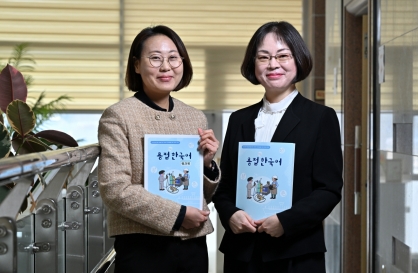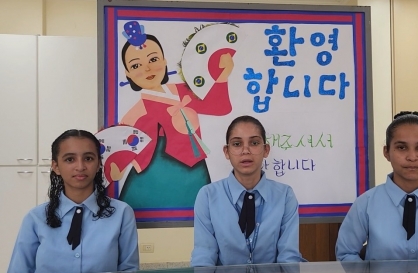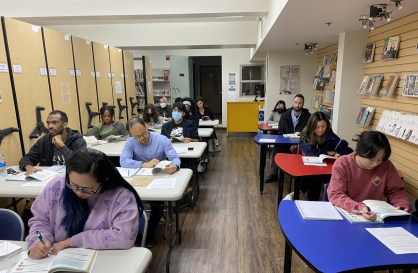Most Popular
Hello Hangeul
-
1
Welding book first in vocational Korean series for foreign labor

-
2
[Korea Beyond Korea] In Sao Paulo, horizons expand for Korean studies
![[Korea Beyond Korea] In Sao Paulo, horizons expand for Korean studies](//res.heraldm.com/phpwas/restmb_idxmake.php?idx=644&simg=/content/image/2023/11/20/20231120000619_0.jpg&u=20231206104853)
-
3
In Brasilia, worldly dreams are born from Korean classes

-
4
Americans seeking to visit Korea learn the language in LA

-
5
[Korea Beyond Korea] Berlin, Europe's Korean Studies hub, nurtures next-gen experts, scholars
![[Korea Beyond Korea] Berlin, Europe's Korean Studies hub, nurtures next-gen experts, scholars](//res.heraldm.com/phpwas/restmb_idxmake.php?idx=644&simg=/content/image/2023/10/18/20231018000929_0.jpg&u=20231023154735)
[Hello Hangeul] Korean language teachers persevere to help learners around globe
By Kim So-hyunPublished : March 19, 2023 - 21:48

Korean used to be a language spoken only on the Korean Peninsula and by nearly 10 million Koreans overseas.
But in recent years, it has become one of the fastest-growing choices for foreign language learners around the world, thanks to the sweeping, universal appeal of Korean dramas, shows and pop music.
Behind the rapid increase of learners are committed teachers with the passion to help earnest young people pursue their dreams despite various predicaments.
Their pay depends on the country or the institution they are working at, and is usually not the reason most people choose this new life path. They say the enthusiasm and sincerity of the learners are what keeps them going, motivating them to be better teachers.
Here, Korean language teachers in several countries shared their experiences with The Korea Herald.
China
In countries like China, the pandemic as well as a number of political and diplomatic factors have dealt a blow to Korean language education in recent years.
Lee Su-jin, who has taught Korean in China since 2014, has witnessed the ups and downs of the two countries’ relations, which have heavily affected students in their 20s and 30s in China.
When China banned all Hallyu content in 2016 following South Korea's deployment of a US Terminal High Altitude Area Defense anti-missile battery, many Chinese students turned away from studying Korean, she said.
“At the height of the conflict over THAAD, a fellow teacher told me her students said, ‘We like you but we don’t like Korea,’ and I felt like some of my students were probably thinking the same,” said Lee, who lived in Beijing for over seven years and then in Shanghai for 6 1/2 years.
“They don’t quit learning English because China is on bad terms with the US, but it’s different for Korean, which is still not a mainstream foreign language in China.”
Despite the changing political situation, however, the demand for learning Korean won’t die out as the interest in Japanese did, because Chinese people still love Korean popular culture, according to Lee.
“I think the power of culture is stronger than politics,” she said.
Among Lee’s students were Canadian and American teachers at her child’s international school who learned the language to communicate better with Korean students, parents and Korean university admissions officers; a then 15-year-old member of a Chinese idol group; foreign nationals married to Koreans; and a CEO from Hong Kong in her 50s who got herself out of depression through watching Korean dramas and studying Korean.
Lee also teaches students in other countries such as Russia, Spain and Vietnam through online courses run by the King Sejong Institute.
“Thinking that pupils from all parts of the globe meet for a common interest that is the Korean language, while studying and sharing their lives together, often makes my heart swell. That’s what keeps me going,” she said.
Nepal
Some schoolteachers or state-certified teachers of Korean sign up for programs run by state-funded organizations to teach Korean in countries like Serbia, Jordan, Kazakhstan, Cambodia and Thailand that have expressed their need for Korean teachers to the Seoul government.
When Hyeon Woo-taek, an elementary school teacher of 20 years, first arrived in Nepal in 2016 through a dispatch program operated by Korea's National Institute for International Education, he sighed when describing the weak local educational infrastructure.
“The school I’m working at is Nepal’s only national university for foreign languages, but the facilities and the overall educational environment can be rather disheartening,” said Hyeon, who said he often felt depressed and homesick living in the Himalayan country.
“But seeing how the Nepali people are so fond of Korea and so eager to learn our language, I feel rewarded and happy that I can teach them.”
According to Hyeon, about 70 percent of Nepali youth go overseas to work as the country lacks jobs and wages are low.
Many go to English-speaking countries to work, while some go to places like Germany which offer affordable education.
Those who have been to Korea generally recommend the country to others, citing its friendly people, relatively easy-to-learn language, great food, higher wages and cleanliness, Hyeon said.
“Most start learning Korean with the aim to get a work permit in Korea, but some study it to acquire technical skills or knowledge about the environment in Korea,” he said.
As the Korean textbooks used in Nepal are poorly bound, low-quality paper books printed in black and white, Hyeon wishes better textbooks could be supplied to them.
Middle and high schools in Nepal are seeking to introduce Korean as a second language, but textbooks need to be developed, and teachers need to be trained, he said, calling for support from the Korean government.
Japan
In neighboring Japan, the demographics of Korean learners have slowly changed over the past two decades.
According to Chung Hyun-hee, who began teaching Korean in Japan in 2006, most of her students back then were middle-aged women who wanted to watch Korean dramas without subtitles or understand what their favorite actors were saying during fan meetings.
“As K-pop became more popular, the age group of female students started to go down and the total number of pupils increased. Among my students were middle-aged men who were interested in Korean history or Korean historical dramas,” she said.
From 2010, Chung began teaching Korean in Japanese high schools.
In her first school, which had just opened, there were only four students in the Korean class.
The number increased by nearly tenfold to about 40 the next year, and to over 60 in the following year, according to Chung, who has written a thesis on Korean language education in Japan.
Chung also teaches middle and high school students at the Korea Cultural Center.
In the teenage demographic, there is also significant interest in Korean games and webtoons among boys, and in Korean fashion and cosmetics among girls, while both love Korean food, she said.
In Japan’s high schools, however, there is no government curriculum on foreign languages other than English. This situation translates into an unstable status for teachers and a lack of state-authorized textbooks, according to Chung.
“To resolve such problems, I think nongovernmental efforts, as well as close cooperation between the governments of Korea and Japan, are necessary. There should also be more exchanges between schools and students,” she said.
Vietnam
Korean teachers all find the opportunity to teach young people of foreign nationality invaluable, and cherish their experiences in the countries they applied to work in, but sometimes, administrative or technical problems get in the way.
Hong Se-hwa, who has taught Korean to middle and high school students in Ho Chi Minh, Vietnam, since 2016 on a dispatch program run by the National Institute for International Education, has struggled with visa delays a number of times.
“Except for the first two years, I’ve constantly had visa issues. Teachers dispatched to Ho Chi Minh through other organizations such as the King Sejong Institute or the Korea International Cooperation Agency also told me they had similar problems,” Hong said.
Hong’s visa wasn’t issued for months after his scheduled date of departure, which means she had to wait for months without knowing when she would be able to leave, or just go on a tourist visa, and then visit a third country to get a short-term work visa later.
The NIIED contract states that the dispatch of a teacher could be postponed or canceled due to visa issues. Most teachers wrap up what they were doing and get ready to leave on the scheduled date, but if the visa is delayed, they have to remain on standby with no work or income.
“Some leave a few months later due to visa delays, which shorten the contract period, and in the worst cases, a dispatch can be canceled after months of waiting,” Hong said, adding that she hopes the issue can be improved.
As part of the Vietnamese Ministry of Education’s pilot project for Korean language education, Hong taught in the Southeast Asian country’s public middle and high schools until early 2021.
Most of her students chose to be in Korean classes when they entered the schools, due to their interest in Korean culture or their parents’ recommendation.
“In 2016, not many students knew about BTS, but in about two to three years, most kids liked BTS and had BTS photos all over their books and notebooks. The younger they are, the more they liked (the Korean variety show) ‘Running Man,’” Hong said.
“But there were also those who are not into the pop culture, but are interested in learning the language … I remember a case where the parents were working in Daegu, and had their child sign up for Korean class because they wanted to bring him to Korea," she said.
Learning for pleasure
In countries like Singapore and Paraguay, a significant number of young people in their 20s and 30s learn Korean just for pleasure.
Park Eun-hye, who taught Korean near Asuncion, Paraguay, at a state-run Servicio Nacional de Promocion Profesional center for a year, said about six students were making a steady effort to come to class.

“Compared to the Philippines, where the learners were really eager to improve their Korean as if their life depended on it, the pupils in Paraguay were attending classes mostly as a hobby,” said Park who taught for a year in the Southeast Asian country in 2019 and in the South American nation in 2021.
“In Paraguay, many students drop out after a few months ... We did a lot of cultural activities in class, like cooking, but not many Paraguayans can eat spicy Korean food,” she said.
Cho Joung-youn has taught Korean in Singapore since 2019 to mostly college students and office workers, a great majority of whose interests in K-pop and Korean dramas led them to learn the language for fun.
“Most show steady attendance in class for a year and half to two years. But some give up before or shortly after they enter the intermediate-level class. Because they are learning it as a hobby, I think once they get busy in school or work, they get to focus less on Korean,” Cho said.
Among her students with unique reasons for learning were a Singaporean doctor who was preparing for training at a Korean medical institution, and a Singaporean student who loved Korea so much that she wanted to emigrate to the country.








![[Today’s K-pop] Blackpink’s Jennie, Lisa invited to Coachella as solo acts](http://res.heraldm.com/phpwas/restmb_idxmake.php?idx=644&simg=/content/image/2024/11/21/20241121050099_0.jpg&u=20241121172748)



![[Korea Beyond Korea] In Sao Paulo, horizons expand for Korean studies](http://res.heraldm.com/phpwas/restmb_idxmake.php?idx=644&simg=/content/image/2023/11/20/20231120000619_0.jpg&u=20231206104853)


![[Korea Beyond Korea] Berlin, Europe's Korean Studies hub, nurtures next-gen experts, scholars](http://res.heraldm.com/phpwas/restmb_idxmake.php?idx=644&simg=/content/image/2023/10/18/20231018000929_0.jpg&u=20231023154735)







